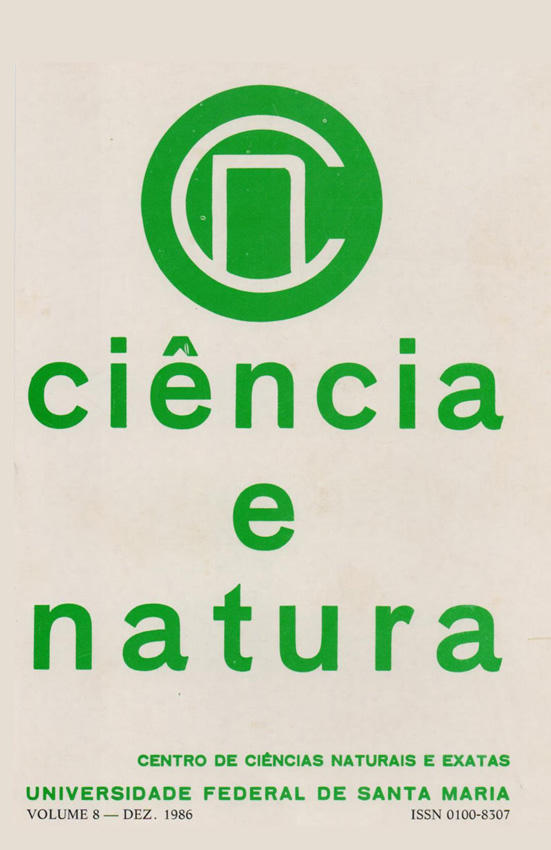As transformações agrárias ocorridas nos municípios de Moji Mirim e Moji Guaçu, SP
DOI:
https://doi.org/10.5902/2179460X25430Resumo
As transformações no meio rural brasieliro tornaram-se evidentes sobretudo a partir de 1960, como reflexo de uma política governamental de incentivo à agricultura e também como consequência de atitudes tomadas desde o momento da ocupação do espaço pelo homem. As tranformações vão se refletir, não somente no espeço e produção, mas também nas condições de vida do homem que habita e trabalha neste espaço. Levando-se em conta estas transformações a nível nacional, foram realizados estudos nos municípios de Moji Mirim e Moji Guaçu, dando ênfase ao grau de mecanização da agricultura ai ocorrida e os problemas encontrados para que ocorra o desenvolvimento rural. Foi verificado que, no espaço analisado, o alto grau de macanização não conduziu ao desejado desenvolvimento rural.
Downloads
Referências
ZIBORDI, Antonio F.G. e SANCHEZ, Miguel C. As Transformações Agrárias Ocorridas nos Municipios de Moji Mirim e Moji Guaçu. Dissertação. Curso de Pós-Graduação da Universidade Estadual Paulista "Júlio de Mesquita Filho", UNESP. Rio Claro, 1980. 187 p.
Downloads
Publicado
Como Citar
Edição
Seção
Licença
Para acessar a DECLARAÇÃO DE ORIGINALIDADE E EXCLUSIVIDADE E CESSÃO DE DIREITOS AUTORAIS clique aqui.
Diretrizes Éticas para Publicação de Revistas
A revista Ciência e Natura está empenhada em garantir a ética na publicação e na qualidade dos artigos.
A conformidade com padrões de comportamento ético é, portanto, esperada de todas as partes envolvidas: Autores, Editores e Revisores.
Em particular,
Autores: Os Autores devem apresentar uma discussão objetiva sobre a importância do trabalho de pesquisa, bem como detalhes e referências suficientes para permitir que outros reproduzam as experiências. Declarações fraudulentas ou intencionalmente incorretas constituem comportamento antiético e são inaceitáveis. Artigos de Revisão também devem ser objetivos, abrangentes e relatos precisos do estado da arte. Os Autores devem assegurar que seu trabalho é uma obra totalmente original, e se o trabalho e / ou palavras de outros têm sido utilizadas, isso tem sido devidamente reconhecido. O plágio em todas as suas formas constitui um comportamento publicitário não ético e é inaceitável. Submeter o mesmo manuscrito a mais de um jornal simultaneamente constitui um comportamento publicitário não ético e é inaceitável. Os Autores não devem submeter artigos que descrevam essencialmente a mesma pesquisa a mais de uma revista. O Autor correspondente deve garantir que haja um consenso total de todos os Co-autores na aprovação da versão final do artigo e sua submissão para publicação.
Editores: Os Editores devem avaliar manuscritos exclusivamente com base no seu mérito acadêmico. Um Editor não deve usar informações não publicadas na própria pesquisa do Editor sem o consentimento expresso por escrito do Autor. Os Editores devem tomar medidas de resposta razoável quando tiverem sido apresentadas queixas éticas relativas a um manuscrito submetido ou publicado.
Revisores: Todos os manuscritos recebidos para revisão devem ser tratados como documentos confidenciais. As informações ou ideias privilegiadas obtidas através da análise por pares devem ser mantidas confidenciais e não utilizadas para vantagens pessoais. As revisões devem ser conduzidas objetivamente e as observações devem ser formuladas claramente com argumentos de apoio, de modo que os Autores possam usá-los para melhorar o artigo. Qualquer Revisor selecionado que se sinta desqualificado para rever a pesquisa relatada em um manuscrito ou sabe que sua rápida revisão será impossível deve notificar o Editor e desculpar-se do processo de revisão. Os Revisores não devem considerar manuscritos nos quais tenham conflitos de interesse resultantes de relacionamentos ou conexões competitivas, colaborativas ou outras conexões com qualquer dos autores, empresas ou instituições conectadas aos documentos.






